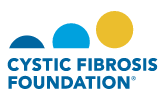Helpline Resource
Online and Automated Telephone Service
What is Cystic Fibrosis?
Cystic Fibrosis, or CF, is a genetic disease affecting approximately 30,000 children and adults in the United States. A defective gene causes the body to produce an abnormally thick, sticky mucus that clogs the lungs and leads to life-threatening lung infections. These thick secretions also obstruct the pancreas, preventing digestive enzymes from reaching the intestines to help break down and absorb food.
More than 10 million Americans are unknowing, symptomless carriers of the defective CF gene. An individual must inherit two defective CF genes, one from each parent, to have CF. Each time two carriers conceive, there is a 25 percent chance that their child will have CF; a 50 percent chance that the child will be a carrier of the CF gene and a 25 percent chance that the child will be a non-carrier.
People with CF have a variety of symptoms including very salty tasting skin; persistent coughing, at times with phlegm, wheezing or shortness of breath, and excessive appetite but poor weight gain. Symptoms vary from person to person due, in part, to the more than 1,000 mutations of the CF gene.
The treatment of CF depends upon the stage of the disease and the organs involved. Clearing mucus from the lungs is an important part of the daily CF treatment regimen. Chest physical therapy is a form of airway clearance done by vigorous clapping on the back and chest to dislodge the thick mucus from the lungs. Other treatments include antibiotics, and other drugs proven effective in thinning mucus.
According to the CF Foundation’s National Patient Registry, the median age of survival for a person with CF is 33 years. As more advances have been made in the treatment of CF, the number of adults with CF has steadily grown.
To learn more about Cystic Fibrosis, please contact the Cystic Fibrosis Foundation at 800-344-4823. You can also visit them online at www.cff.org.
Phone code: 1750
More than 10 million Americans are unknowing, symptomless carriers of the defective CF gene. An individual must inherit two defective CF genes, one from each parent, to have CF. Each time two carriers conceive, there is a 25 percent chance that their child will have CF; a 50 percent chance that the child will be a carrier of the CF gene and a 25 percent chance that the child will be a non-carrier.
People with CF have a variety of symptoms including very salty tasting skin; persistent coughing, at times with phlegm, wheezing or shortness of breath, and excessive appetite but poor weight gain. Symptoms vary from person to person due, in part, to the more than 1,000 mutations of the CF gene.
The treatment of CF depends upon the stage of the disease and the organs involved. Clearing mucus from the lungs is an important part of the daily CF treatment regimen. Chest physical therapy is a form of airway clearance done by vigorous clapping on the back and chest to dislodge the thick mucus from the lungs. Other treatments include antibiotics, and other drugs proven effective in thinning mucus.
According to the CF Foundation’s National Patient Registry, the median age of survival for a person with CF is 33 years. As more advances have been made in the treatment of CF, the number of adults with CF has steadily grown.
To learn more about Cystic Fibrosis, please contact the Cystic Fibrosis Foundation at 800-344-4823. You can also visit them online at www.cff.org.
Phone code: 1750


